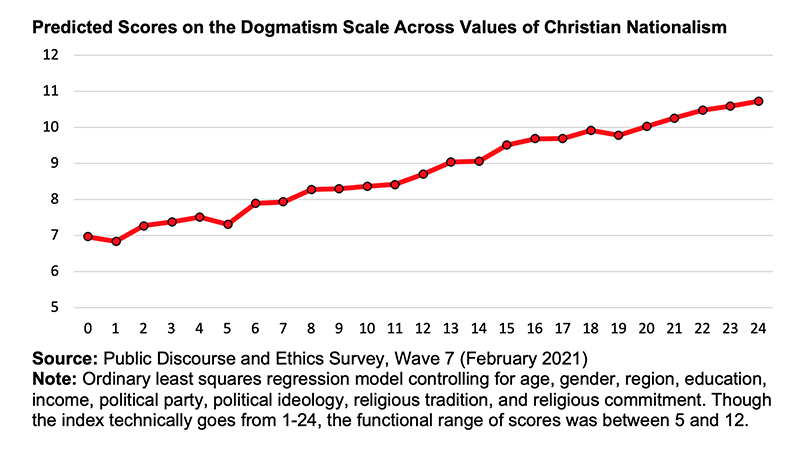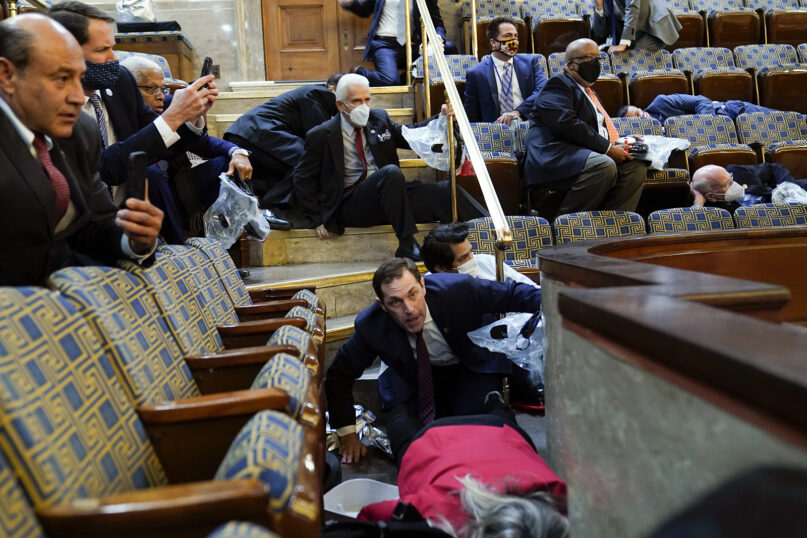(RNS) — As the nation remembered the Capitol riots on Jan. 6 earlier this month, a deluge of articles highlighted the role of white Christian nationalism and its ongoing threat to democracy. This was absolutely necessary. Yet, white Christian nationalism has been tied to an even greater crisis over the past year, namely, the COVID-19 pandemic and widespread reluctance to get vaccinated.
Studies show that Americans who espouse Christian nationalist ideology are more likely to refuse vaccination, despite extensive evidence that the vaccines are safe and effective.
Why is Christian nationalism connected with both the Capitol riots and vaccine refusal?
One reason is that Christian nationalism is powerfully linked with white Americans affirming baseless conspiracies, including QAnon myths, antisemitic tropes, rampant voter fraud, Trump’s “Big Lie” and general vaccine misinformation. Another, no doubt, is that such Americans trust right-wing television, websites and radio for their news.
RELATED: Violence isn’t the only way Christian nationalism endangers democracy
But there is something more fundamental going on — something that makes these Americans vulnerable to conspiracy theories and bad information. Multiple data points show such Americans have a greater tendency toward dogmatism — the tendency to insist one’s beliefs are true without regard for counter-evidence.
In a recent study, my co-authors and I tested how Americans who affirm Christian nationalist ideology scored on a quiz of scientific facts. Americans scoring higher on Christian nationalism didn’t score lower on science questions that asked about things like lasers, genes, molecules or viruses. But Christian nationalism was the strongest predictor that they would score lower on questions about religiously contested scientific facts such as the Big Bang or natural selection.
Christian nationalism, in other words, didn’t necessarily coincide with ignorance. Rather, it reflected a powerful dogmatism that rejected any facts that were inconsistent with cherished narratives.
In another co-authored study, we tested whether Christian nationalism predicted how Americans scored on a quiz about religion in American political history. Unsurprisingly, we found white Americans who scored higher on Christian nationalism criteria also held incorrect views about things like whether the Supreme Court actually banned people from praying in schools (no) or whether the First Amendment allows Congress to privilege Christianity (no).
But again, the scoring patterns were revealing. Not only were white Christian nationalists more likely to pick incorrect answers that stressed the supremacy and victimization of Christianity, they were also less likely to pick “don’t know” responses.
Not only were they wrong; they were confidently wrong — dogmatically wrong.
We observed this dogmatic tendency in a more direct way in a February 2021 survey in which psychologist Josh Grubbs and I asked Americans how much they agreed with six statements affirming that they could be wrong and would be willing to change their minds when confronted with new evidence.
- I question my own opinions, positions, and viewpoints because they could be wrong.
- I reconsider my opinions when presented with new evidence.
- I recognize the value in opinions that are different from my own.
- I accept that my beliefs and attitudes may be wrong.
- In the face of conflicting evidence, I am open to changing my opinions.
- I like finding out new information that differs from what I already think is true.
Americans who disagreed with these statements would be considered more dogmatic. We added up the questions to create a scale from 1 to 24, with higher scores indicating greater dogmatism.
Even after we account for political conservatism, religious commitment and other social characteristics, we find Christian nationalism is the leading predictor that white Americans are more dogmatic. That is to say, embracing the view that America has been and should always be distinctly “Christian” is the leading indicator that white Americans are unwilling to consider the possibility that they could be wrong, that they are unwilling to change their views even in the face of conflicting evidence (see Figure).

Courtesy graphic
Christian nationalism, then, correlates with dogmatism. But does one cause the other? And if so, which causes which?
Perhaps some of both. In fact, both nationalist feeling and dogmatic belief are likely influenced by a combination of personality and a cultural context that stresses holding onto certain beliefs “by faith” regardless of evidence. Our current levels of polarization are only worsening the problem. Both white Christian nationalism and the intense dogmatism that accompanies it are amplified by in-group and out-group dynamics.
White Christian nationalism ebbs and flows throughout American history as dominant majorities perceive threats to their cultural and political status. Experimental research affirms that white Christians who are exposed to messages about their impending minority status respond with greater Christian nationalism and xenophobia. And perceptions of past, present and future victimization already dominate white Christian nationalist narratives.
The same seems to be true of dogmatic commitment to misinformation. Committed partisans are guided by “motivated reasoning” to seek out and believe factually incorrect information about their political opponents, even when they are offered financial incentives for gathering correct information. The psychic rewards of tribal psychology and confirmation bias supersede financial gain.
This is obviously a tremendous challenge. But we are not powerless. All of us can take personal responsibility for toning down rhetoric, paying for responsible journalism, reposting only accurate information and reporting fake news.
RELATED: Dissent from Traditional Plan dominates United Methodists’ top court meeting
But beyond this, several studies now confirm that deplatforming bad actors is actually effective. When politicians or provocateurs who repeatedly sow hatred and misinformation online are banned from mainstream social media platforms, their reach isn’t completely eliminated. But it is constrained.
A sizable minority of white Americans embrace the view that America has been and should always be for “Christians like us.” Even as their numbers diminish in the general population, bad actors are working to isolate and radicalize these Americans toward political goals. Along with striving to persuade our fellow citizens who are being manipulated, sidelining those bad actors wherever possible should be our top priority.
(Samuel L. Perry is an associate professor of sociology at the University of Oklahoma. He is the author of two books on Christian nationalism, including the award-winning “Taking America Back for God: Christian Nationalism in the United States” (with Andrew L. Whitehead) and the forthcoming “The Flag and the Cross: White Christian Nationalism and the Threat to American Democracy,” with Philip Gorski. The views expressed in this commentary do not necessarily reflect those of ARDA or Religion News Service.)
Ahead of the Trend is a collaborative effort between Religion News Service and the Association of Religion Data Archives made possible through the support of the John Templeton Foundation. See other Ahead of the Trend articles here.





